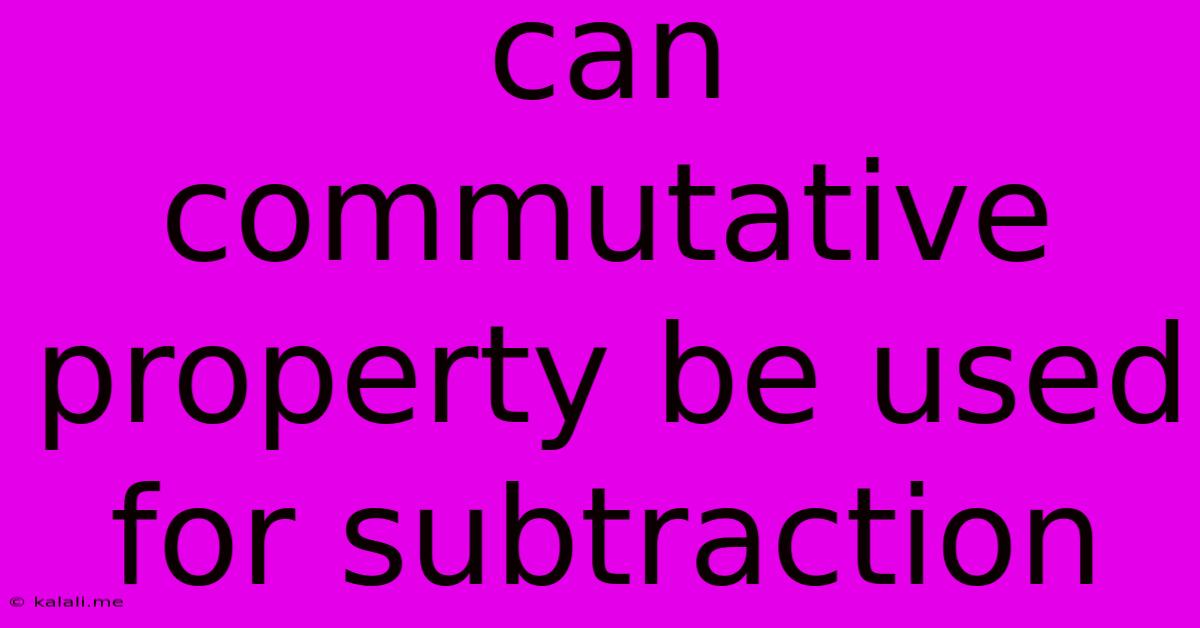Can Commutative Property Be Used For Subtraction
Kalali
Jun 06, 2025 · 2 min read

Table of Contents
Can the Commutative Property Be Used for Subtraction?
The short answer is: no, the commutative property does not apply to subtraction. This is a fundamental concept in mathematics, and understanding why is crucial for mastering algebraic operations. This article will explain the commutative property, why it doesn't work for subtraction, and what happens when we try to apply it. We'll also look at related concepts and offer some examples to solidify your understanding.
The commutative property states that the order of operands does not change the result of the operation. In simpler terms, you can swap the numbers around, and the answer remains the same. This property holds true for addition and multiplication. For example:
- Addition: 2 + 3 = 3 + 2 = 5
- Multiplication: 2 x 3 = 3 x 2 = 6
However, subtraction is a different story. Subtraction involves finding the difference between two numbers, and the order matters significantly. Let's illustrate this:
- Subtraction: 5 - 2 = 3, but 2 - 5 = -3
The results are clearly different, demonstrating that the commutative property does not hold for subtraction. Changing the order of the numbers in a subtraction problem fundamentally alters the outcome. This is because subtraction represents a reduction or a taking away of a quantity.
Understanding the Difference
The difference between addition/multiplication and subtraction lies in their inverse operations. Addition's inverse is subtraction, and multiplication's inverse is division. The commutative property works seamlessly with operations and their inverses because the underlying mathematical structures allow for such flexibility. Subtraction, however, lacks this symmetry. The inverse of subtraction is addition, but simply reversing the order of numbers in a subtraction problem doesn't produce a consistent or meaningful result within the context of the operation.
Common Mistakes and Misconceptions
A common mistake is assuming that because addition is commutative, subtraction must be as well. This stems from a superficial understanding of the properties of arithmetic operations. It's essential to remember that each operation has its own unique set of rules and properties.
Practical Applications and Implications
Understanding the non-commutative nature of subtraction is crucial for solving various mathematical problems. In algebra, for instance, correctly interpreting the order of operations (PEMDAS/BODMAS) ensures accurate calculations. Incorrect application of the commutative property to subtraction can lead to significant errors in more complex equations and real-world applications. This includes problems involving measurements, finances, and physics, where the order of operations is critical for accurate results.
In conclusion, the commutative property is a valuable tool in mathematics, but it is strictly limited to specific operations. While it works perfectly for addition and multiplication, it does not apply to subtraction. Recognizing this distinction is essential for developing a robust understanding of arithmetic and algebra. Remember, the order of numbers in subtraction significantly impacts the final answer. Always maintain the correct order to ensure accuracy in your calculations.
Latest Posts
Latest Posts
-
Avoid To Use Scripts On Visual Studio Code
Jun 06, 2025
-
How To Remove Mold From Silicone
Jun 06, 2025
-
Powershell Add A New Column To Ordered List
Jun 06, 2025
-
How Do You Pronounce F E T E
Jun 06, 2025
-
How Long Are Rice Krispies Treats Good For
Jun 06, 2025
Related Post
Thank you for visiting our website which covers about Can Commutative Property Be Used For Subtraction . We hope the information provided has been useful to you. Feel free to contact us if you have any questions or need further assistance. See you next time and don't miss to bookmark.